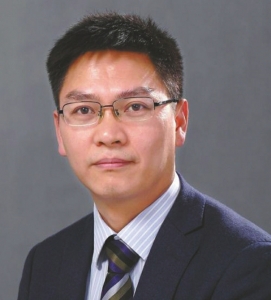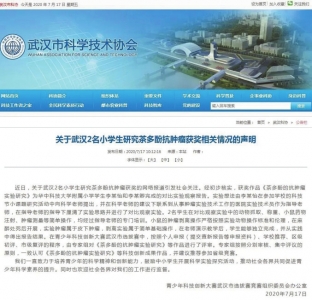
Li Hongliang. According to the website of Wuhan University

On the website of Wuhan Association for Science and Technology, a survey response to the controversy caused by the award of primary school students’ research on "drinking tea to fight cancer" was released.
Li Hongliang, the "academic star" of Wuhan University and the dean of basic medical college, has been involved in the controversy several times in recent years after being reported for academic fraud a few years ago.
The last time was in July this year. At that time, two primary school students in Wuhan were questioned after they won the third prize in the primary school group of the 33rd National Youth Science and Technology Innovation Competition for their research on "Tea Polyphenols Against Cancer". Li Hongliang was the father of these two award-winning primary school students.
According to The Paper and other media reports, people familiar with the matter disclosed that on the afternoon of September 15th, a meeting was held to evaluate and recommend the change of the administrative leadership of the School of Basic Medicine of Wuhan University. Li Hongliang made a report on his work and "voluntarily" offered to resign as dean. In the previous few months, he was removed from the positions of director of the Animal Experiment Center of Wuhan University and director of ABSL-III Laboratory of Wuhan University by Wuhan University.
At present, Wuhan University has not responded to whether Li Hongliang "voluntarily" offered to resign as dean. As can be seen from the information disclosure website of Wuhan University, the school issued a notice on May 10th this year, saying that after research by the school, it was decided to remove the director of the Animal Experiment Center of Wuhan University in Li Hongliang and the director of ABSL-Ⅲ Laboratory of Wuhan University from May 6th, 2020.
Academic star
Won the "Tan Jiazhen Life Science Innovation Award".
As can be seen from the website of Wuhan University, the job information of Li Hongliang on the website of the School of Basic Medical Sciences has not changed. Still: Li Hongliang, currently the Dean of Basic Medical College, Director of model animal Institute of Wuhan University, Deputy Director of Cardiovascular Institute of Wuhan University, and Director of Medical Science Research Center of Central South Hospital.
According to the website of Wuhan University, Li Hongliang graduated from Guangdong Medical University with a bachelor’s degree in 1999, obtained a master’s degree from Jinan University in 2002, and obtained a doctor’s degree from Peking Union Medical College in 2005. He studied under the famous molecular biologists Liu Depei and Liang Zhi from China. In 2006 -2007, Li Hongliang went to Harvard Medical School as a postdoctoral fellow, and in 2007 -2008, he worked as a postdoctoral fellow and head of a scientific research team at the University of Toronto.
Li Hongliang returned to China in 2008 and served as the deputy director of the Institute of Cardiovascular Diseases of Wuhan University People’s Hospital. On December 20, 2016, the Organization Department of the Party Committee of Wuhan University announced that Li Hongliang, who was born in 1974, was to be the dean of the Basic Medical College of Wuhan University. Li Hongliang is an expert on cardiovascular metabolic diseases and model animal. On November 18th, 2017, he also won the "Tan Jiazhen Life Science Innovation Award".
Li Hongliang once told the media that his research team has more than 100 people, which is one of the largest research teams in the domestic medical research field.
Have been reported
"There are two major problems in animal experiments"
Li Hongliang’s involvement in the storm began in January 2018. On January 2nd of that year, Li Hongliang’s team published a paper in Nature Medicine, an international top academic journal with an impact factor of over 30. On January 18th, Ho Wz, a professor at the same school, questioned two papers published in Nature-Medicine by Li Hongliang’s team in February 2017 and May 2017: "Improving nonalcoholic steatohepatitis in mice and nonhuman primates by targeting CFLAR" and "Improving nonalcoholic fatty liver disease in mice and monkeys by targeting lysosomal degradation of Tlr4 by using the vesicular regulatory protein Tmbim1". Ho Wz believes that Li Hongliang’s team has two major problems in key animal experiments: the experimental period and the number of animals are insufficient.
With the fermentation of events, more papers published by Li Hongliang since his master’s degree have been questioned for fraud.
However, this report gave a conclusion after the school investigation. On January 29th, 2018, Wuhan University published the "Investigation Opinions on the Academic Misconduct Reported by Team Li Hongliang" in Weibo, arguing that there was no academic fraud in the reported content of Team Li Hongliang, but there were some omissions in the writing of the paper.
At the end of 2019, Li Hongliang was once again caught in a storm. At that time, a screenshot of a network transmission showed that Rao Yi, the president of Capital Medical University, came forward to report Li Hongliang’s academic fraud under his real name, and "suggested that the National Natural Science Foundation of China effectively and boldly investigate Li Hongliang’s blatant fraud in Wuhan University Medical College for 17 years".
After that, the media sent a screenshot of the online transmission to Rao Yi himself for verification. Rao Yi replied: "No, there was a draft."
Make another storm
Involved in the daughter’s "drinking tea to fight cancer" award-winning controversy
On July 16th, this year, it was reported that the prize-winning study of "drinking tea to fight cancer" by sisters of primary school students in Wuhan attracted wide attention from netizens.
At that time, it can be seen in the official website of the National Youth Science and Technology Innovation Competition that a pair of third-grade and fifth-grade primary school students affiliated to Huazhong University of Science and Technology participated in the 33rd National Youth Science and Technology Innovation Competition and won the third prize in the primary school group. The project is called "Anti-tumor Experimental Study of Tea Polyphenols". It is mentioned in the project introduction that EGCG, the main component of tea polyphenols in green tea extract, is used as the test drug to study its in vivo efficacy in nude mice liver tumor disease model. Twenty-five days after drug treatment, it was found that the tumor volume of mice in EGCG group was smaller than that in normal saline group and adriamycin group. This experiment showed that catechol EGCG extracted from green tea had certain anti-tumor effect.
Netizens questioned that the project requires researchers to carry out mouse experiments, and the experiments require high logic, which is difficult for primary school students to complete. According to media reports, the father of these two pupils is Li Hongliang.
For this matter, Li Hongliang once responded in an interview with the media: "I did not participate in my daughter’s experimental research." "I personally think that this research and application are in line with the norms." Wuhan Association for Science and Technology also issued a statement on July 17, responding that the experimental idea was put forward by students, and after instructing the teacher’s demonstration teaching, the students independently completed the experiment and obtained the report results.
According to the notice of appointment and dismissal issued by the information disclosure website of Wuhan University, the school has appointed Lan Ke as the director of the Animal Experiment Center of Wuhan University and the director of ABSL-III Laboratory of Wuhan University in May this year for a period of five years.
Then, it is still unknown why Li Hongliang was removed from the above two positions, and whether he "voluntarily" resigned as the dean of the School of Basic Medicine of Wuhan University on September 15th.